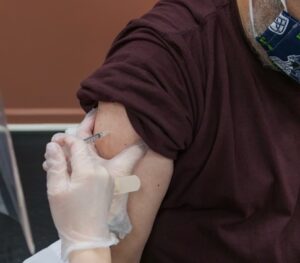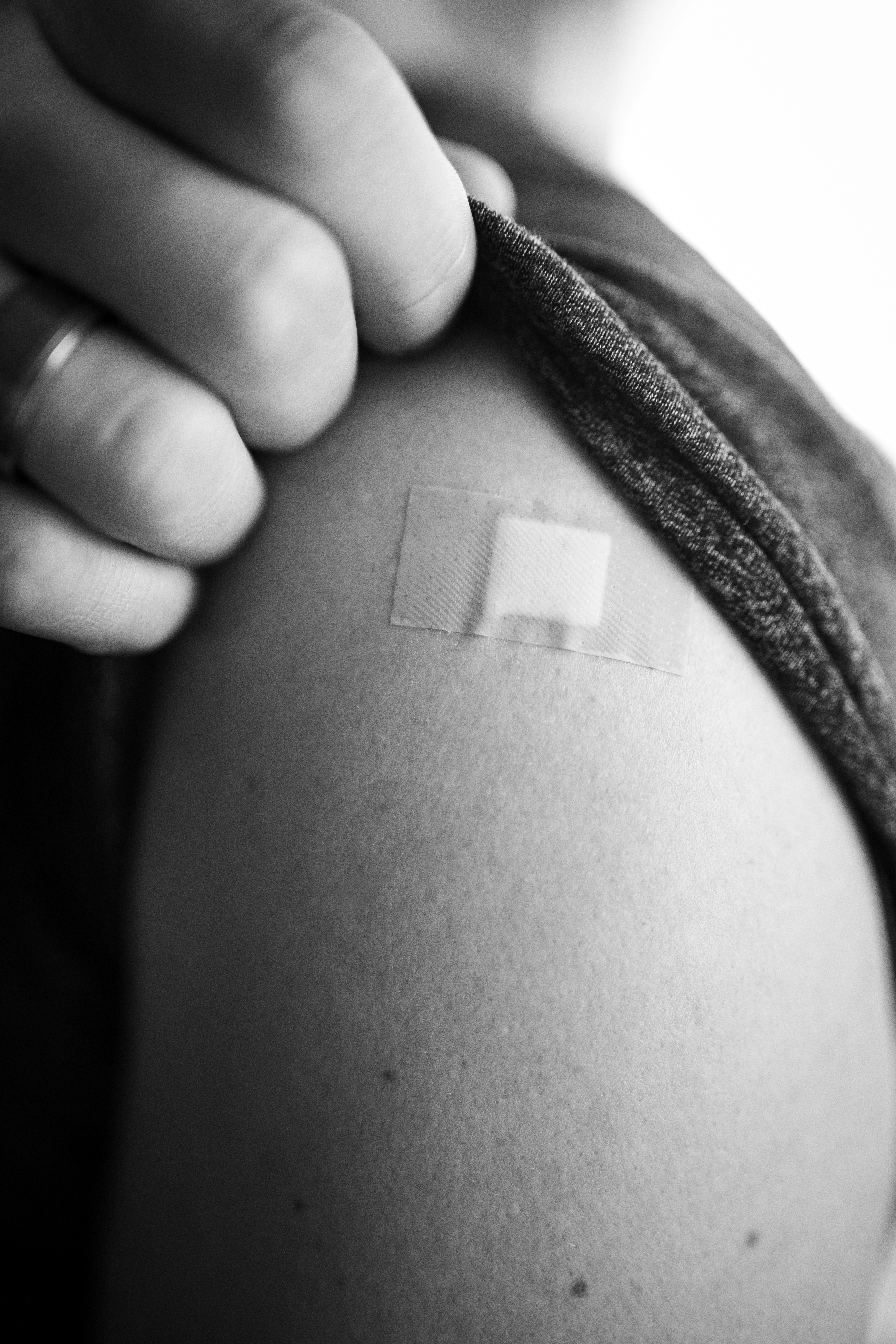 Oh it’s not that kind of shot. It’s the other kind of shots, which require some modification for people with cancer. It just
Oh it’s not that kind of shot. It’s the other kind of shots, which require some modification for people with cancer. It just
so happens that ASCO (American Society of Clinical Oncology) has come out with new guidelines regarding vaccines for cancer patients.
The guidelines include a recommendation for doctors to take vaccination histories at the start of cancer treatment, followed by provision of recommended vaccines, re-vaccination after cancer treatments that wipe out immunity (for instance stem cell transplant), as well as vaccination of household contacts in order to protect the cancer patient.
We are more vulnerable to infection, because our immune system is injured by chronic inflammation, by the cancers, and by our treatments. Also, we don’t get as good an immune boost from some vaccines as people without cancer do.
If our immune system is “compromised” we can’t take live vaccines at all, and non-live vaccines aren’t as effective. Live vaccines contain weakened but still replicating virus or bacteria. They cause a mild infection in normal people, which triggers an immune
response. But for those of us with a weakened immune system, live vaccines, such as chicken pox/shingles, measles, mumps, oral typhoid, and German measles, can cause a real infection. Non-live vaccines are safe, including the new RNA vaccines. Non-live vaccines for different conditions can be given on the same day.
Here is a summary of recommendations, which I have shortened for prostate cancer:
- “Clinicians should determine vaccination status and ensure that adults newly diagnosed with cancer and about to start treatment are up to date on seasonal vaccines as well as age- and risk-based vaccines
- Vaccination should ideally precede any planned cancer treatment by 2-4 weeks. However, nonlive vaccines can be administered during or after chemotherapy or immunotherapy, hormonal treatment, radiation, or surgery
- Adults with solid and hematologic cancers traveling to an area of risk should follow the CDC standard recommendations for the destination
Note. Hepatitis A, intramuscular typhoid vaccine, inactivated polio, hepatitis B, rabies, meningococcal, and nonlive Japanese encephalitis vaccines are safe - It is recommended that all household members and close contacts, where feasible, be up to date on vaccinations “
Here are some specific recommended immunizations for adults with Cancer:
| Vaccine | Recommended Age | Schedule |
|---|---|---|
| Influenzaa | All ages | Annually |
| RSV | 60 years and older | Once |
| COVID-19 | All ages | As per the latest CDC schedule for immunocompromised17 |
| Tdap or Tdb | 19 years and older | One dose of Tdap, followed by Td or Tdap booster every 10 years |
| Hepatitis B | 19-59 years: eligible 60 years and older: immunize those with other risk factorsc |
For adults 20 years and older, use high antigen (40 µg) and administer as a three-dose Recombivax HB series (0, 1, 6 months) or four-dose Engerix-B series (0, 1, 2, 6 months)18 |
| Recombinant zoster vaccine | 19 years and older | Two doses at least 4 weeks apart |
| Pneumococcal vaccine | 19 years and older | One dose PCV15 followed by PPSV23 8 weeks later OR One dose PCV20d |
| HPV | 27-45 years: shared decision making | Three doses, 0, 1–2, 6-monthsAbbreviations: HPV, human papillomavirus; PCV, pneumococcal conjugate vaccine; PPSV-23, 23 valent Pneumococcal polysaccharide vaccine; RSV, respiratory syncytial virus; Td, tetanus and diphtheria; Tdap, tetanus, diphtheria and pertussis. a Live attenuated influenza vaccine, which is administered as a nasal spray, cannot be given to patients with cancer. bTdap has lower amounts of diphtheria and pertussis toxoid and is only used for those 7 years and older. DTaP, the pediatric vaccine for prevention of tetanus, diphtheria, and pertussis, is only for children younger than 7 years. cHIV, chronic liver diseases, intravenous drug use, sexual risk factors, incarcerated individuals. dPatients who have previously received PCV13 only can receive one dose of PCV 20 after an interval of 1 year. |
Abbreviations: HPV, human papillomavirus; PCV, pneumococcal conjugate vaccine; PPSV-23, 23 valent Pneumococcal polysaccharide vaccine; RSV, respiratory syncytial virus; Td, tetanus and diphtheria; Tdap, tetanus, diphtheria and pertussis.
a Live attenuated influenza vaccine, which is administered as a nasal spray, cannot be given to patients with cancer.
bTdap has lower amounts of diphtheria and pertussis toxoid and is only used for those 7 years and older. DTaP, the pediatric vaccine for prevention of tetanus, diphtheria, and pertussis, is only for children younger than 7 years.
cHIV, chronic liver diseases, intravenous drug use, sexual risk factors, incarcerated individuals.
dPatients who have previously received PCV13 only can receive one dose of PCV 20 after an interval of 1 year.
Now, a few further details about some common shots:
COVID
The COVID-19 vaccines protect patients with cancer, reducing the risk of severe COVID-19 illness and hospitalization. The recommendation is to receive at least one dose of the updated 2023-2024 COVID-19 vaccine. For those on therapies which diminish the immune response, ASCO recommends additional vaccine doses after 2 months. It is recommended to postpone immunization for 2-3 months for individuals who have recently had a COVID-19 infection.
FLU
It is safe to vaccinate during chemotherapy or while white cells are low. But the nasal spray flu vaccine should not be given to patients with cancer.
Pneumonia
Patients with cancer are at higher risk for pneumonia. (Blood cancers 50 times the risk!) Pneumonia vaccines reduce the chances of getting pneumonia and the need for hospitalization.
Shingles
There is a new vaccine called RZV. It is non-live so OK for us. (the previous vaccine, a live attenuated type, is not recommended for patients with cancer.) RZV should be made available to all adults with cancer. This vaccine remains immunogenic even after cancer treatment has begun.
RSV
Patients aged 60 years and older with cancer are eligible to receive the respiratory syncytial virus vaccine.
Our immunity to tetanus, diphtheria, and pertussis weakens as we age, and this decline may be accelerated after cancer treatment. It is strongly recommended that individuals diagnosed with cancer receive the Tdap vaccine if they have not been vaccinated as adults.
Why bother?

“Infections are the second most common cause of non–cancer-related mortality within the first year after a cancer diagnosis, with most of these deaths attributed to influenza and pneumonia, deaths that can be prevented throughimmunization. While patients with cancer have lower immune responses to influenza and pneumococcal vaccines, evidence supports the safety and benefits of vaccinations in reducing the severity of infections and associated hospitalizations.”
Often we will see the term “immunocompromised.” Does this apply to us? This term is not, to my knowledge, precisely defined. For those of us with prostate cancer, it usually means neutrophils (a type of white blood cell) are down below 1000 cells per microliter of blood, and is usually due to our treatments. The immune system is complex, and there are many ways to become “immunocompromised.” Anyone on chemotherapy could be considered to be immunocompromised. .Ask your oncologist if you fit this category, and if you know of a clear generally accepted definition, please write to me.
The authors sum up: “A cancer diagnosis can be overwhelming, and vaccination may not be an immediate priority in the treatment plan. However, numerous studies consistently highlight the best protection when vaccines are administered before starting cancer treatment, emphasizing the need for early vaccination.”
- Work cited: Mini Kamboj et al. Vaccination of Adults With Cancer: ASCO Guideline. JCO 0, JCO.24.00032 DOI:10.1200/JCO.24.00032
Special thanks to beloved AnCan moderator and Advisory Board member ‘Dr. John’ for providing this wonderful write up!

